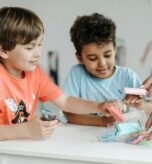Introduction
The concept of a growth mindset has become one of the most influential ideas in modern education. Defined by psychologist Carol Dweck, a growth mindset refers to the belief that intelligence and abilities can be developed through effort, strategies, and support. In contrast, a fixed mindset assumes that intelligence is static and cannot change. To explore this concept in practice, researchers recently implemented the “I Can Learn” Growth Mindset Program in Finnish elementary schools. The study examined how the program influenced third-grade students’ attitudes towards learning, effort, and mistakes.
What Is the Growth Mindset Program?
The I Can Learn program was specifically designed for Finnish elementary schools. It consisted of six interactive lessons focusing on:
Understanding the brain and neuroplasticity
Learning why mistakes and failures are normal in the learning process
Building positive effort beliefs (“I will try again”, “I can improve with practice”)
Practicing emotional regulation strategies such as calming down or seeking help
Developing effort-based self-talk rather than ability-based self-talk
This program aimed to align with Finland’s holistic educational philosophy, which emphasizes equality, inclusiveness, and the belief that every child can reach their potential.
The Research Study
The study included 116 third-grade students from two schools in Helsinki. Students were divided into three groups:
Intervention group – participated in the I Can Learn Growth Mindset Program
Control group 1 – took part in a health-focused program (nutrition, sleep, exercise)
Control group 2 – continued with their normal school routine
Data was collected using both quantitative methods (surveys about mindset and effort beliefs) and qualitative methods (student diaries where children reflected on challenges).
Key Findings
- Short-Term Effects
Immediately after the intervention, the intervention group showed clear changes compared to control groups:
Students used more emotional control strategies such as calming themselves or taking a deep breath.
They practiced more effort-focused self-talk (“I’ll try again”) rather than ability-focused self-talk (“I’m smart, I can do this”).
They reported less negative thinking when making mistakes.
- Long-Term Effects
However, 18 months later, the differences between groups had disappeared. While the intervention group maintained their effort-based self-talk, the control groups naturally caught up over time. This suggests that the Finnish educational environment itself already supports growth mindset development.
- No Strong Quantitative Impact
Interestingly, survey data did not show significant long-term improvements in students’ overall mindset or effort beliefs. Researchers suggest that self-report surveys may not fully capture young children’s attitudes, or that Finland’s education system already creates a growth-mindset-friendly culture.
Why This Matters
The Growth Mindset Program in Finnish elementary schools highlights a critical lesson: short-term workshops can spark change, but long-term impact requires integration into school culture. Teachers and parents play an essential role in reinforcing growth-oriented thinking daily.
In Finland, where inclusiveness and student well-being are already core values, the program still managed to give children tools to cope better with mistakes and challenges. This shows that growth mindset pedagogy is not just a theoretical idea—it can be practiced, taught, and strengthened in real classrooms.
Practical Tips for Educators
Educators worldwide can take inspiration from this study. Here are some ways to apply growth mindset principles in classrooms:
Normalize mistakes – remind students that errors are part of learning.
Encourage effort-based praise – say “I like how hard you tried” instead of “You are smart.”
Teach self-talk strategies – guide children to use phrases like “I’ll try again” or “I can improve.”
Integrate into daily routines – reinforce growth mindset not just in special lessons but in everyday classroom culture.
Conclusion
The I Can Learn Growth Mindset Program in Finnish elementary schools demonstrates that even a short, six-lesson intervention can positively influence how children face challenges. While the strongest effects were short-term, the program provided valuable insights into how schools can cultivate resilience, persistence, and the belief that abilities can grow with effort.
In today’s rapidly changing world, these lessons are more important than ever. Whether in Finland or elsewhere, helping students build a growth mindset prepares them not just for academic success, but for lifelong learning.
Sourse: Laine, S., Puusepp, I., Kuusisto, E., Rissanen, I., & Tirri, K. (2025). A mixed-methods study on the effects of a growth mindset program in Finnish elementary schools.




